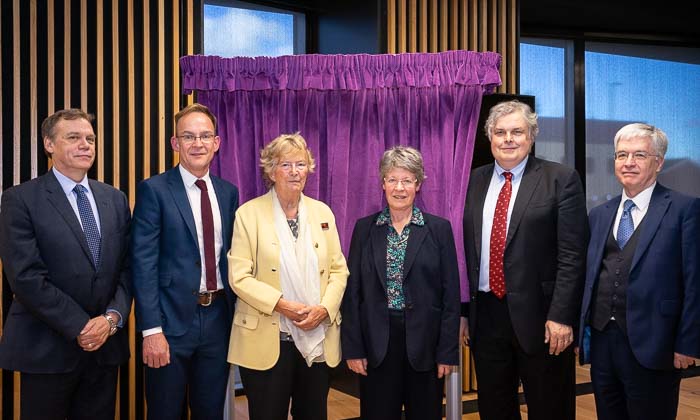A stellar addition to Physics and Astronomy
01 Nov 2018
The Schuster Annexe has been officially opened by Dame Jocelyn Bell Burnell and a lecture theatre is named in her honour

A new annexe has been created on the School of Physics and Astronomy’s Schuster Building at The University of Manchester to provide space to grow the School and take in more undergraduate and postgraduate students.
At the heart of the Schuster Annexe is the Ideas Mill, an innovative and flexible space for collaborative teaching and learning. The Ideas Mill will also extend outreach activities and provide a venue for schools, colleges and industry.
The Schuster Building was built in 1967 and has been the home to many world-changing discoveries. Graphene was first isolated in its laboratories in 2004 by Professors Sir Andre Geim and Sir Konstantin Novoselov, for which they won the Nobel Prize. This latest expansion, which has been funded by the then Higher Education Funding Council for England (HEFCE) and The University of Manchester, will enable the School to cater for the growing interest in physics and other science, technology, engineering and mathematics (STEM) subjects following a significant increase in applications to the School of Physics and Astronomy in recent years. By upgrading the facilities and focusing on creating spaces to develop skills supporting graduate employability, the School aims to make its students even more attractive to potential employers.
Professor of Experimental Particle Physics Stephen Watts said: “We are very proud of our new building and what it will enable us to do. The Ideas Mill will enable us to teach in an active rather than passive mode, improving students’ employability. We have also created a networking hub with courses for school teachers and pupils, a community drop-in space, careers advice and a business drop in centre.”
Diana Hampson, Director of Estates and Facilities at The University of Manchester, added: “The Schuster Annexe is a fantastic new addition to our campus and an important component of the University’s Campus Masterplan, providing an exceptional new teaching and learning space for our physics and astronomy students.”
Head of School and Professor of Nuclear, Physics Professor Sean Freeman, said: “The School is absolutely delighted with the Schuster Annexe. The new teaching labs are stunning and make an excellent environment in which to learn laboratory skills. The flexible space on the ground floor enables many different modes of operation that have already been employed in innovative teaching sessions, interactions with industry, outreach work, open days, workshops and other events.”
To celebrate the opening of this exciting new facility, the School of Physics and Astronomy will be hosting an official opening ceremony on 1 November 2018. The Vice-President and Dean of the Faculty of Science and Engineering, Professor Martin Schroder, will preside and Professor Dame Jocelyn Bell Burnell, the pre-eminent astrophysicist, will deliver a commemorative lecture after having the new lecture theatre named in her honour. The President of the Institute of Physics, Professor Dame Julia Higgins, will reflect on Dame Jocelyn’s career and invite her to unveil a plaque to mark the naming.
Dame Jocelyn observed the first pulsar on 28 November 1967 and has an unparalleled record of leadership within the physics and astronomy communities, having served as President of the Royal Astronomical Society, the Royal Society of Edinburgh and the Institute of Physics.
Among her numerous awards are: the Herschel Medal of the Royal Astronomical Society, the Royal Medal of the Royal Society, the Institute of Physics President’s Medal, the Grande Médaille of the French Academy of Sciences and a special Breakthrough Prize in Fundamental Physics in 2018.
Dame Jocelyn is an honorary graduate of The University of Manchester and to endorse her fantastic commitment to the field of physics and astronomy, The Bell Burnell lecture theatre will act as a home for students in the School of Physics and Astronomy throughout their academic career. It will also be open for use by other students from across the University.
